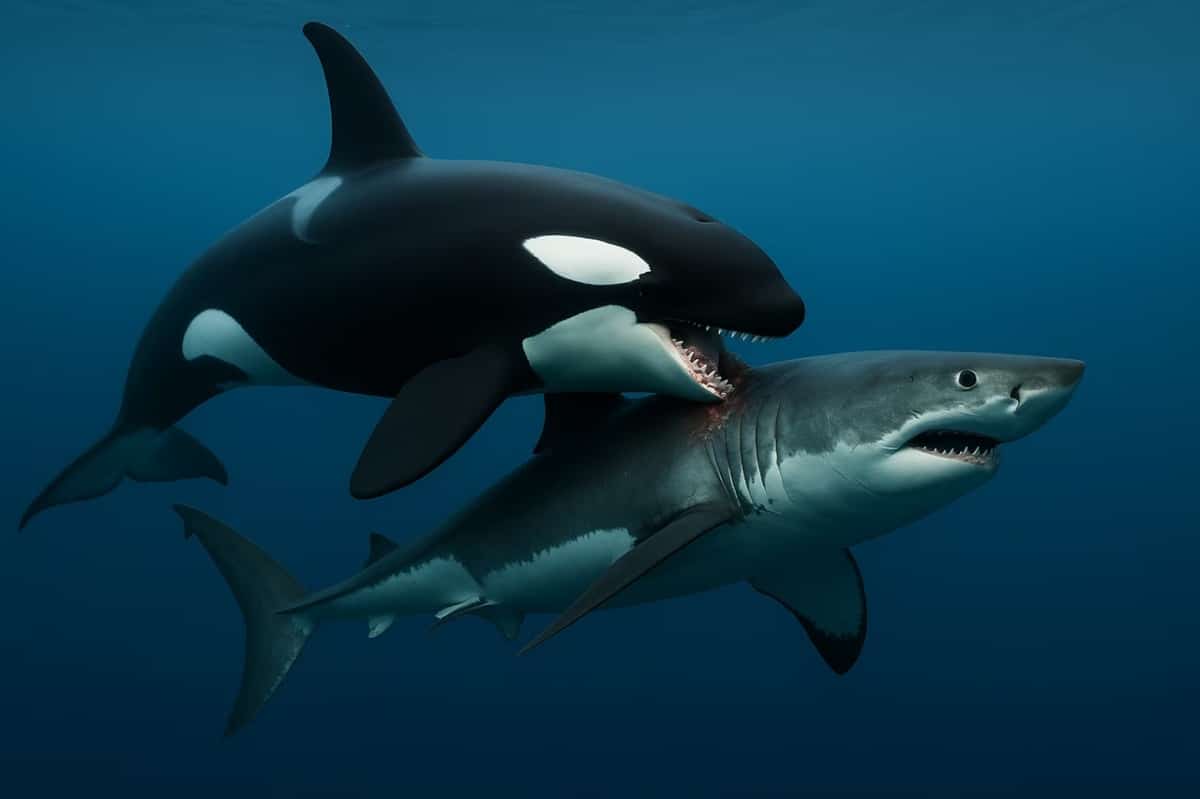For a long time, the great white shark reigned as the undisputed ruler of the seas. But it seems that title may now belong to someone else. In the waters of the Pacific, another predator has cracked the code—and it’s using brains over brawn to take down the ocean’s most feared hunter.
Off the coast of Mexico, a team of marine biologists recently observed a group of orcas (Orcinus orca) attacking great white sharks (Carcharodon carcharias) with surgical precision. Led by a dominant male named Moctezuma, these orcas belong to a still poorly understood population known for its opportunistic hunting style. Some of them, however, appear to have specialised in preying on sharks—a behaviour already recorded with whale sharks.
Researchers captured two coordinated attacks, in 2020 and 2022, where five orcas worked together to flip young great whites onto their backs. This move exploits a well-known weakness: when a shark is turned upside down, it enters a state of total paralysis called tonic immobility. The orcas take full advantage of this frozen moment, extracting the shark’s liver, which is packed with fat and nutrients, before leaving the rest of the carcass behind.
The observations, published in Frontiers in Marine Science, reveal a collective and highly intelligent hunting strategy that uses the shark’s own biology against it. ‘This behaviour demonstrates remarkable intelligence and social learning,’ explains marine biologist Erick Higuera Rivas (Conexiones Terramar, Pelagic Life). The sharing of liver among adults and calves even suggests a cultural transmission of hunting techniques—a kind of orca “masterclass” passed from one generation to the next.
An elite strategy reshaping the ocean hierarchy
Scientists suspect that these hunts mostly target juvenile sharks, which pose less danger to orcas. Still, the effect on great white populations could be significant. In South Africa, the appearance of specialised orcas has already driven adult sharks to flee en masse from their usual feeding grounds.
‘We still don’t know whether the sharks’ flight responses are instinctive or learned,’ says marine ecologist Salvador Jorgensen from California State University. Researchers are now calling for increased monitoring of the Gulf of California to determine how often these attacks occur and how best to protect shark habitats.
‘Understanding the feeding behaviour of these predators will help us identify their critical areas and better regulate human activity,’ concludes marine biologist Francesca Pancaldi (Cicimar, Mexico).
The findings paint a fascinating picture: a species once viewed as the apex predator of the oceans may now have met its match. Intelligent, social, and extraordinarily strategic, the orca reminds us that in nature, power doesn’t always win—sometimes, it’s cleverness that rules the waves.

Cécile Breton
Journalist
Since childhood, books, photography, and travel have been part of my world. Fascinated by life, by the stars, by landscapes that tell stories without a single word, I quickly realized that I needed to express what I saw and felt.
Passionate about the world around me, I first pursued a degree in History at university, driven by my fascination with the stories of the past and the great civilizations that shaped our world. But over the years, another truth became clear: I didn’t want to spend my life in archives or research. I wanted to be out in the field, behind a camera or in front of a microphone, sharing what I learned.
So, I took a new path. I chose journalism, to learn how to tell stories differently—with rigor and clarity. I learned how to write, to interview, to edit, to capture both attention and emotion.
Giving meaning and sharing what matters
Since then, I’ve worked across different media: print, web, radio, television, and video. All of this has allowed me to bring to life topics that matter deeply to me: nature, animals, space, and the major environmental and human issues of our time.
Today, I continue my journey as a journalist at Futura. As part of the editorial team, I strive to share knowledge with curiosity, clarity, and passion. My guiding thread? To make visible what deserves to be seen, understood, and shared—and to keep my sense of wonder alive.

